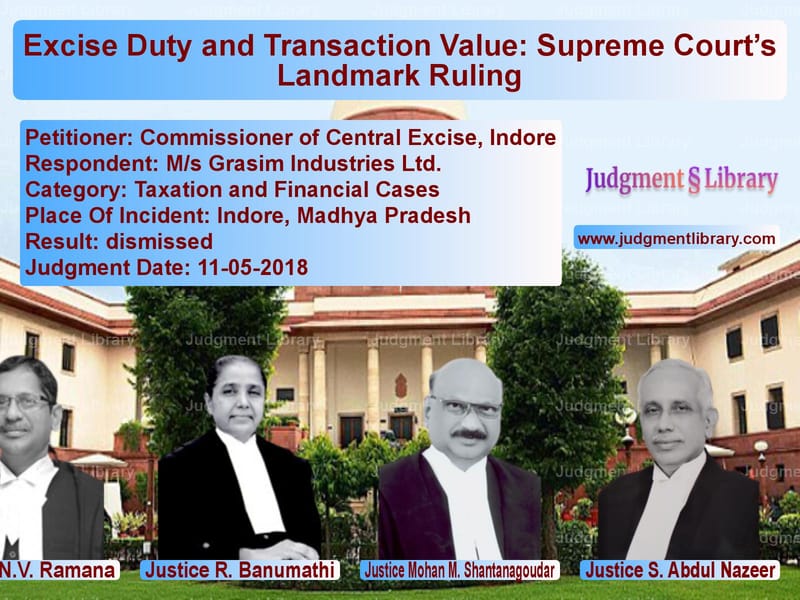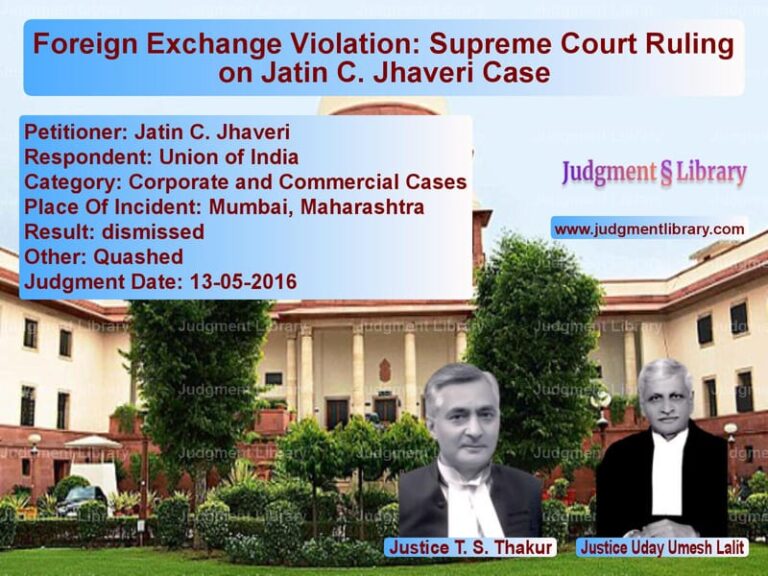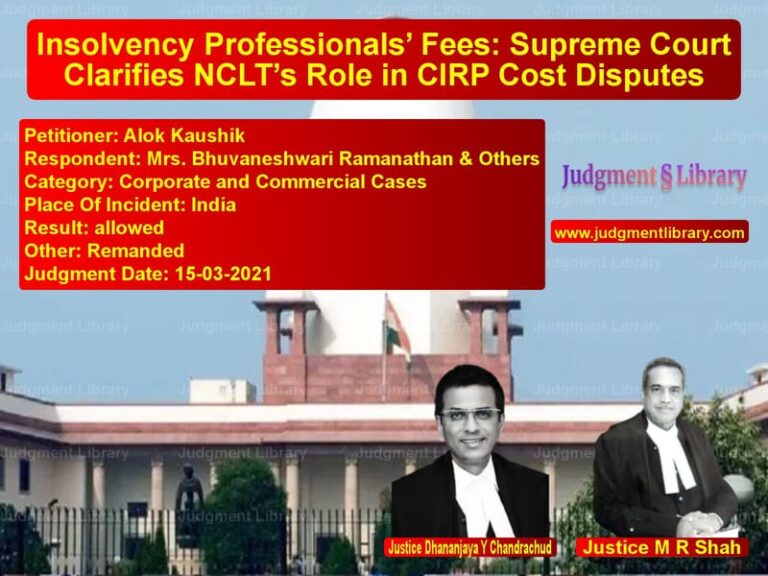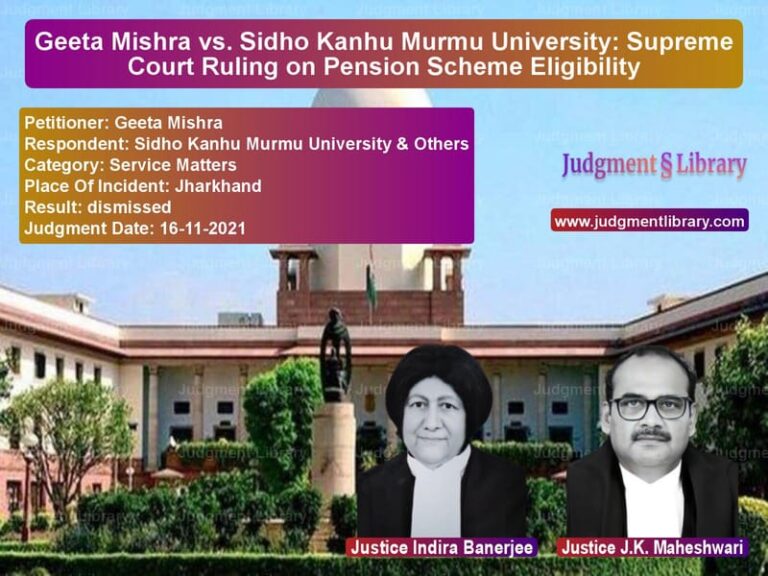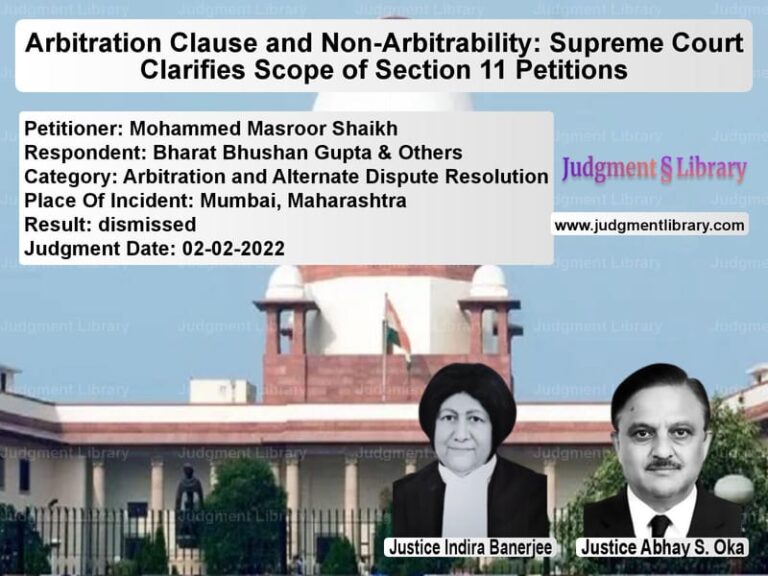Excise Duty and Transaction Value: Supreme Court’s Landmark Ruling
The case of Commissioner of Central Excise, Indore v. M/s Grasim Industries Ltd. revolves around the interpretation of excise duty under the Central Excise Act, 1944, particularly the concept of ‘transaction value’ as amended in 2000. The Supreme Court had to determine whether certain ancillary charges levied by manufacturers should be included in the assessable value of goods for excise duty calculation.
Background of the Case
The respondent, M/s Grasim Industries Ltd., is a manufacturer of industrial gases, liquid chlorine, and other allied products. The issue arose when the Excise Department sought to include various charges such as packing charges, facility charges, service charges, delivery and collection charges, and rental charges in the assessable value for excise duty.
The department argued that these charges enhanced the overall value of the goods and should be part of the taxable amount, whereas the manufacturer contended that these were separate service charges and should not be included in the excise valuation.
Key Legal Issues
- Whether Section 4 of the Central Excise Act, 1944, as amended, should be interpreted independently or in conjunction with Section 3.
- Whether the concept of ‘transaction value’ under the 2000 amendment differs materially from the previously used ‘normal price’ concept.
- Whether ancillary charges such as packing, wear and tear, and collection charges should be included in the taxable value.
Arguments by the Petitioner
The Commissioner of Central Excise argued that:
- Excise duty is levied on the manufacturing of goods, and all charges incurred before the sale should be included in the assessable value.
- The amendment in 2000 replaced ‘normal price’ with ‘transaction value’ to broaden the scope of taxation.
- Past judgments, including Union of India v. Bombay Tyre International Ltd., support the inclusion of such charges in the taxable value.
Arguments by the Respondent
The manufacturer, M/s Grasim Industries Ltd., countered that:
- Excise duty should only be levied on the manufacturing cost and profit, and not on additional charges imposed for logistical or service-related factors.
- Post-manufacturing charges should not be included in excise valuation as they are optional and not integral to the goods’ value.
- The principle that excise is a tax on manufacture, not on sale, should remain unchanged.
Supreme Court’s Observations
The Supreme Court analyzed past judgments, particularly Bombay Tyre International Ltd., Acer India Ltd., and Union of India v. Voltas Ltd. It observed:
“Excise is a levy on manufacture and upon the manufacturer who is entitled under law to pass on the burden to the first purchaser of the manufactured goods. The levy of excise flows from a constitutional authorization under Entry 84 of List I of the Seventh Schedule to the Constitution of India.”
The Court further noted that ‘transaction value’ introduced under the 2000 amendment was intended to include all costs associated with making the goods marketable. It explicitly ruled:
“Transaction value as defined in Section 4(3)(d) statutorily engrafts the additions to the ‘normal price’ under the old Section 4 as held to be permissible in Bombay Tyre International Ltd.”
Final Judgment
The Supreme Court ruled in favor of the Commissioner of Central Excise, stating that all ancillary charges that add to the product’s value before sale must be included in the excise valuation. The Court concluded:
“The measure of the levy contemplated in Section 4 of the Act will not be controlled by the nature of the levy. So long as a reasonable nexus is discernible between the measure and the nature of the levy, both Section 3 and Section 4 would operate in their respective fields.”
Implications of the Judgment
This ruling has significant implications for manufacturers and tax authorities:
- Ensures a broader tax base by including ancillary charges in excise valuation.
- Clarifies that transaction value under the 2000 amendment aligns with the judicially recognized normal price principle.
- Provides clear guidance for future disputes regarding excise valuation.
Conclusion
The Supreme Court’s decision in Commissioner of Central Excise, Indore v. M/s Grasim Industries Ltd. is a landmark ruling that clarifies the scope of excise duty valuation. By reinforcing the principle that all costs contributing to a product’s marketable value should be included in the taxable amount, the judgment strengthens the taxation framework and prevents undue exclusions that could lead to revenue loss.
Petitioner Name: Commissioner of Central Excise, Indore.Respondent Name: M/s Grasim Industries Ltd..Judgment By: Justice Ranjan Gogoi, Justice N.V. Ramana, Justice R. Banumathi, Justice Mohan M. Shantanagoudar, Justice S. Abdul Nazeer.Place Of Incident: Indore, Madhya Pradesh.Judgment Date: 11-05-2018.
Don’t miss out on the full details! Download the complete judgment in PDF format below and gain valuable insights instantly!
Download Judgment: Commissioner of Cent vs Ms Grasim Industrie Supreme Court of India Judgment Dated 11-05-2018.pdf
Direct Downlaod Judgment: Direct downlaod this Judgment
See all petitions in Income Tax Disputes
See all petitions in GST Law
See all petitions in Tax Evasion Cases
See all petitions in Judgment by Ranjan Gogoi
See all petitions in Judgment by N.V. Ramana
See all petitions in Judgment by R. Banumathi
See all petitions in Judgment by Mohan M. Shantanagoudar
See all petitions in Judgment by S. Abdul Nazeer
See all petitions in dismissed
See all petitions in supreme court of India judgments May 2018
See all petitions in 2018 judgments
See all posts in Taxation and Financial Cases Category
See all allowed petitions in Taxation and Financial Cases Category
See all Dismissed petitions in Taxation and Financial Cases Category
See all partially allowed petitions in Taxation and Financial Cases Category

